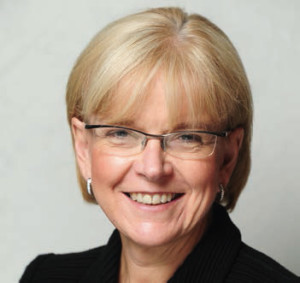
Despite a series of trials for both bankers and corporates, including new competitors and technology and increasingly complex regulation, there’s a rewarding outcome on the horizon, says a senior figure at one of the world’s leading banks
The challenges and opportunities facing both banks and corporates have been outlined by one of RBS’s most senior bankers in an exclusive interview with Cash&Trade.
Carole Berndt, the bank’s head of Global Transaction Services, said that she and her team saw “challenge coming from new competitors, new technology, increasingly broad and complex regulations and geo-political risk in an uncertain and increasingly volatile world”.
Amplifying this, she added, “While technology lowers the barriers to entry for alternative payment and currency providers, the need to implement increasing regulatory and operational risk controls requires massive investment in systems that is unlikely to realise a return in the foreseeable future.”

Asked if she could elaborate on the themes and trends on the industry, and whether or not banks were making sufficient investments, she replied, “I think banking in general now has come to a crossroads of understanding around the world that ‘banking will never be what it used to be in the past’ when capital was cheap and banks were making a lot of money from lazy deposits.
“Banks in general were operating in a comfortable environment. The true cost of banking was not really fully understood, corporates had money on operating accounts, charging transaction fees and committing to capital without a full return on the capital.
“This positioned transaction banking as a true enabler as it facilitated the movement of funds, which was critical during the 2008 crisis. What emerged out of this was a barrage of controls and changes of the regulatory environment, which rightly aimed to make banking safer generally.
“However, these changes had flows and effects. We saw interest rates plummet, costs of capital and expenses increase, and a rapid advancement in technology. So in the transaction banking space generally we find ourselves trying to make money with significant concerns – e.g., capital now has a cost, there is a cost to compliance, technology has advanced to a point where we, as consumers, expect more. At the same time, many banks still run their infrastructure on old technology.

“The fact is that we, as bankers, think we can be everything to everybody. This is not the case anymore. We will see banks contract to areas of specialisation, be it on a product or a geographical base, or both.
“As a result, we will see partnerships between banks, not just in the sense of simple co-operation agreements, but multi-partner alliances going beyond a correspondent banking relationship with a truly integrated partnership. If we are good regarding one product in one geographical area and another bank is good in another geographical area then rather than build and start competing with each other, the question has to be – ‘why don’t we work together’?
“My personal view, is that the days of universal banks are limited. They are limited because nobody has unlimited capital and one cannot operate effectively in 100 countries and be equally good in every country.
“Therefore, if you look at the Middle East, there are local banks in Saudi, Qatar, and the UAE that do the job exceptionally well, perhaps better than RBS. Conversely, though, those banks will probably not be the best in other geographies where we may excel. So partnership opportunities are starting to emerge.
“During the last Sibos in Boston, all the banks were talking to each other about partnerships. Today, RBS has an on-going partnership with Citizen in the US, to provide services to RBS clients in the US.
“RBS also has clients in the UK, Middle East and Asia who need American services that we would refer to Citizens Bank and work with them. We will see similar partnerships grow, through different models, taking on board the regulatory requirements in each country. For example, in the Nordic countries, one can carry out a full-integration partnership by hooking up one’s technology with the local bank. In the long run, corporate banks will have more choices.”
Berndt also touched on something she had raised at the 2014 Euro Finance event in Budapest, which RBS sponsored – “disruptive innovation”. She explained that it was a phrase first used by Clayton Christensen, a Harvard professor, to describe a process by which a product or service takes root initially in simple applications at the bottom of a market and then relentlessly moves up-market, eventually displacing established companies.
“In fact,” she said, “the definition of disruptive encompasses everything from a mild disturbance to complete derailment and disarray. This, of course, means different things to different companies but for banks it touches on the challenges that I set out earlier.
“There’s no doubt that it is a challenging climb ahead, and while much effort has already been spent, the reality is banks are still only at base camp, planning and preparing for the push up the mountain.
“History demonstrates that in times of rapid technological change, disruptive innovation prevails over sustaining innovation, and we consistently see new entrants prevail over existing players. It’s the economic reality of the theory of evolution.
“So it’s all about getting on the right side of disruptive innovations. Learning to adapt, survive and thrive.
“Just as there are stories of companies that have been displaced, there are many other companies that have transitioned well, reinventing themselves. Lego is a perfect illustration. There is no better example of how a company revamped its business, its core products and used this as a foundation for building a relevant and successful business today. It harnessed disruptive innovation, created new value and markets by leveraging technology, not viewing it only as a competitor. Those bricks, first manufactured in 1949, compete as effectively today as they did when first launched.
“But what does this all mean for the banks? Suffice to say life is getting very interesting…
“The days when capital was abundant and cheap, regulations light and farming revenue from spreads was relatively easily done have all passed into history. Aspirations of global supremacy and one-stop corporate and investment banking shops are starting to give way to the reality of what is possible given the constraints of returns, regulations and resources.
“Today, banks are centring themselves on geographic and product areas of speciality. They are doing less, but doing it better by not spreading themselves too thin. On the client side, similar decisions are being taken – which clients can we bank well, make an adequate return from and support in a meaningful way? Most banks will emerge from this detox fitter and healthier, with fewer clients but with deeper relationships.
“It is not easy; our new reality will see us each centre our expertise and partner more, to ensure the client’s need for global banking is still delivered.
“These won’t be the basic partnerships of the past; they will be truly integrated. We don’t have to look further than the airline industry to see how this will play. Starting first with cooperation agreements and code sharing, evolving into formal alliances, multi-partner alliances such as One World and even into joint ventures, equity stakes and new companies such as IAG.
“In this new world of bank alliances, and extending the airline analogy, which airline will you fly with, and with which alliance will you build your loyalty? Is it best to just get the best price, or go for reliability, service, and punctuality? Do you build loyalty with one and enjoy the benefits of Platinum, or do you play another game? The analogy is being stretched, but the scenarios are real.
“What will your bank strategy be? Will capital continue to drive relationships, or will capability prevail? Is it about price or performance? How will you balance operational risk, regulatory risk and financial risk? The answers will be different for everyone, but common themes will emerge.
“It’s a brave new world, but one that I believe we have the opportunity to architect and build. And here is one final thought…
“Think back to the most disruptive time in your life, when everything changed; your world was turned upside down. For many, this will be when you brought home your first child from the hospital. There was no instruction book, no map to the future, nothing made sense, it was very hard and disruptive to your life but you prevailed. Today, though, most would say that being a parent was the best thing to happen to them, the most rewarding and the thing that made them who they are today.
“My final point is that disruption can and does lead to good outcomes; and, as we move forward, I see an interesting journey and a rewarding outcome, for both corporates and banks.” n
Carole Berndt, head of Global Transaction Services, RBS
Carole Berndt is one of RBS’s most senior bankers, bringing both a depth of industry expertise and wealth of international experience to the bank’s global transaction services (GTS) business.
As a member of the executive committee of the bank’s Corporate and Institutional division, she has been instrumental in developing and driving forward the strategy of the GTS business in line with overall bank objectives.
She joined RBS from Bank of America Merrill Lynch, where she was head of transaction services for EMEA for more than three years. Prior to that, she spent nearly 10 years working for Citigroup in New York and Hong Kong, where she held a range of senior GTS roles, including global head of client delivery.
Well known throughout the industry, a hallmark of her success has been to build businesses based on people by attracting and growing the right talent.
The importance of MENA
Cash&Trade also asked Carole Berndt whether she saw growth for RBS through its Middle East regional office, particularly in the key markets of Saudi Arabia and the UAE.
“Trade,” she said, “is one of our strongest pillars today, and one that we continue to invest in. You cannot have a global trade business and not include the Middle East. RBS recently appointed one of the best in the business, Martin Knott, as its global trade head, with the mandate to grow that business with adequate returns.
“Also, in February 2014, RBS aligned and simplified its global organisation from seven divisions to three, within the entire bank, to support RBS’s market coverage. For example, we had a very large product team in The Netherlands, part of the legacy of ABN Amro, very talented and hard working people, but it was difficult to articulate products for the Middle East and Asia out of that area due to not being in the market or ‘breathing it’.
“RBS is focused on being close to its clients, and has invested in a special programme to energise our people with the confidence to step up in the MENA market. The programme is also being rolled out to 1000 people globally.”
 Cash And Trade Magazine For Cash and Trade professionals in the Middle East
Cash And Trade Magazine For Cash and Trade professionals in the Middle East




